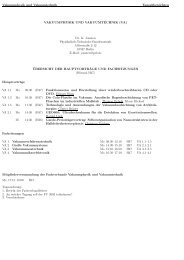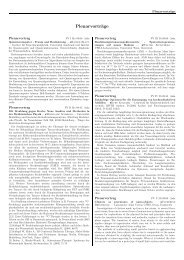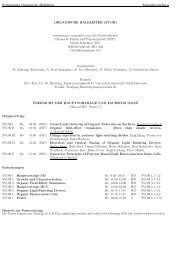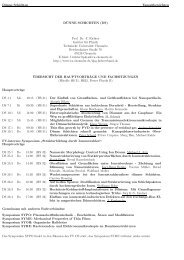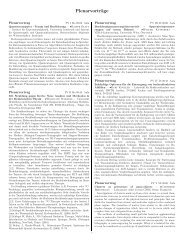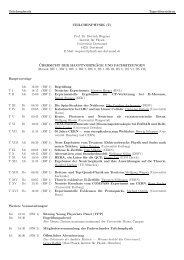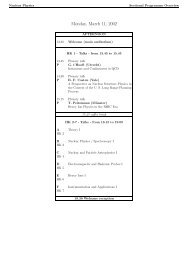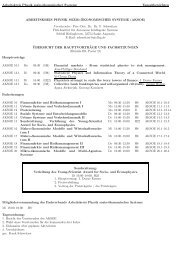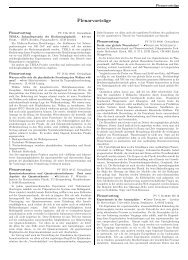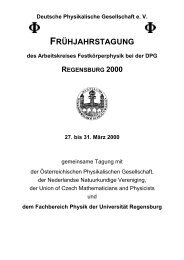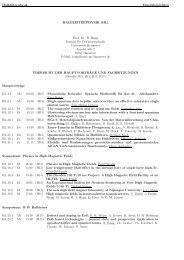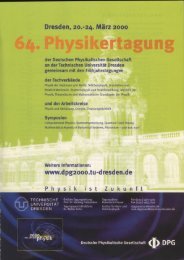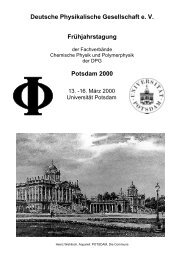Plenarvorträge - DPG-Tagungen
Plenarvorträge - DPG-Tagungen
Plenarvorträge - DPG-Tagungen
Create successful ePaper yourself
Turn your PDF publications into a flip-book with our unique Google optimized e-Paper software.
Arbeitskreis Physik sozio-ökonomischer Systeme Mittwoch<br />
AKSOE 8 Makro-ökonomische Modelle und Wirtschaftswachtum II<br />
Zeit: Mittwoch 16:00–18:00 Raum: H8<br />
AKSOE 8.1 Mi 16:00 H8<br />
Thermodynamics of Economic Growth — •Jürgen Mimkes —<br />
Physik Department Universität Paderborn<br />
Thermodynamics is a statistical theory, that applies to all large systems<br />
with constraints (E). In liquids atoms are under constraints of energy (E).<br />
In economies people are under constraint of capital (E). According to the<br />
second law of thermodynamics,<br />
dW = d E - T dS<br />
Work (W) in atomic systems increases the amount of energy (E) and<br />
reduces the energy distribution (S). T is ordering parameter, in liquids<br />
T is the temperature or mean kin. energy. In Carnot cycles work may<br />
be applied to raise (heat pump) or reduce (refrigerator) the temperature<br />
(T).<br />
Work (W) in economic systems increases the amount of capital (E)<br />
and reduces the capital distribution (S). The economic temperature T<br />
is the mean capital or standard of living. The economic cycle of goods<br />
and capital corresponds to the Carnot cycle. Production cycles lead to<br />
exponential economic growth, to saturation or reduction of the standard<br />
of living (T). The results are compared to data of East-West Germany<br />
and US-Japan.<br />
AKSOE 8.2 Mi 16:30 H8<br />
An Inquiry into the Nature of the Economy — •Hans G.<br />
Danielmeyer — Mozartstr. 69, 85521 Ottobrunn<br />
After a brief review of macroeconomic theory a new, closed theory is<br />
presented that includes social order as input besides human ability and<br />
physical capital. As the lifetimes of the inputs are natural constants of the<br />
human species, they lend the economy an intrinsic dynamical behavior<br />
beyond economic control. Strong growth periods cause inevitably long<br />
range economic problems. The classical advice to invest physical capital<br />
is counterproductive. The correct production function is discovered.<br />
Former functions can be obtained as mathematical approximations for<br />
perfect social order. The development of the industrial society in general<br />
is as slow as it is because it requires the interactive removal of barriers to<br />
technical, educational, and social advances. Below that benchmark level,<br />
the development of a real nation can be dramatic, depending on the level<br />
of destruction afflicted to physical and social capital per capita. The latter<br />
has an inherited component and a direction. For the first time the<br />
global mixed social order economy is tractable. The quantitative agreement<br />
between the real long-term input and output trajectories for Germany,<br />
Japan and the USA is excellent although their input dynamics<br />
differ considerably.<br />
AKSOE 8.3 Mi 17:00 H8<br />
Konsumverhalten und die Dynamik der Mode — •Thomas<br />
Brenner — Max-Planck-Institut zur Erforschung von Wirtschaftssystemen,<br />
Kahlaische Str. 10, 07745 Jena<br />
Dieses Papier untersucht die Wechselwirkung zwischen Konsumenten<br />
und die daraus entstehende Modedynamik. Ziel ist es dabei zu prüfen,<br />
welche Aspekte eine wiederkehrende Veränderung von Mode zu erklären.<br />
Dazu wird ein Modell des Konsumverhaltens entwickelt, das auf dem<br />
Verstärkungslernen basiert. Es wird davon ausgegangen, dass der Konsum<br />
von Gütern verstärkt wird, die entweder ebenfalls von anderen Konsumenten<br />
gewählt werden oder neu sind. Den Konsumenten wird damit<br />
eine Präferenz für Konformität und Neuigkeit unterstellt. Eine Modellierung<br />
der entstehenden Interaktion zwischen Konsumenten zeigt,<br />
dass diese beiden Präferenzen nicht ausreichen, um eine wiederholte<br />
Veränderung der Mode zu erklären. Deshalb wird mit Hilfe eines Simulationsmodells<br />
untersucht, welche zusätzlichen Umstände die wiederkehrende<br />
Veränderung von Mode erklären. Es werden verschiedene Modelle<br />
untersucht, die eine Veränderung der Konsumentenpopulation, eine Wiedererlangung<br />
der Attraktivität durch Güter bei ausbleibendem Konsum<br />
oder eine Veränderung der angebotenen Güter beinhalten. Es zeigt sich,<br />
dass nur bestimmte Modellvarianten die wiederkehrende Veränderung der<br />
Mode erklären, und dass die Produzenten maßgeblich and der Dynamik<br />
der Mode beteiligt sind.<br />
AKSOE 8.4 Mi 17:30 H8<br />
Complexity and Evolutionary Economics — •Carl Henning<br />
Reschke — Mainzer Str. 80, 50678 Koeln, affiliation: Universitaet Witten/Herdecke<br />
The aim of this paper is to sketch a strategic map of some of the relevant<br />
issues at the intersection of economics, sociology and evolutionary<br />
theories. Methodologically a successful integration of these areas requires<br />
a transfer of complexity methods and development of further methods in<br />
the complexity area. The paper therefore poses challenges to complexity<br />
researchers as well as discusses how these areas intersect conceptually.<br />
I review approaches to complexity from physics, computer science and<br />
biology.<br />
Each of these disciplines offers a specific way of dealing with complex<br />
phenomena, with distinctive advantages and disadvantages. Physics measures<br />
potentially relevant characteristics. Computer science aims at algorithmic<br />
accounts of how complex systems can be artificially constructed.<br />
Evolutionary thinking asks for the adaptive value of specific characteristics.<br />
It shifts attention from a generalized standard optimality criterion<br />
to a differentiated account of selection criteria and selection conditions<br />
in specific circumstances. Hypotheses and are illustrated with examples<br />
from the pharmaceuticals market.<br />
AKSOE 9 Symposium: Fat Tail Distributions – Application from Physics to Finance<br />
Zeit: Donnerstag 09:30–12:30 Raum: H1<br />
AKSOE 9.1 Do 09:30 H1<br />
Symposium: Fat Tail Distributions – Applications from Physics<br />
to Finance — • —<br />
AKSOE 10 Mikro-ökonomische Modelle und Multi-Agenten-Systeme<br />
Zeit: Donnerstag 14:00–17:30 Raum: H8<br />
Hauptvortrag AKSOE 10.1 Do 14:00 H8<br />
Physicists’ Insights into Wealth Distributions — •Frantiˇsek<br />
Slanina — Institute of Physics, Academy of Sciences of the Czech Republic,<br />
Na Slovance 2, CZ-18221 Praha, Czech Republic<br />
Distribution of wealth in human society was one of first features of<br />
socio-economic systems which was attempted to approach scientifically.<br />
Empirical analysis performed by Vilfredo Pareto lay down the foudation<br />
of the quantitative analysis of social inequality which was of first concern<br />
throughout the 19th century. The famous Pareto law, claiming power-law<br />
distribution of wealth, robust in time and valid in all diverse societies,<br />
was re-examined many times since then. Several other functional dependencies<br />
were suggested, but the essential message that the tail of the<br />
distribution follows a power-law passed all tests.<br />
However, the explanation of the Pareto tail was less straightforward<br />
than it might have seemed. In our talk we summarise several approaches,<br />
including Lotka-Volterra equations, random directed polymers and idealgas<br />
analogies. We will present a new model of wealth exchange which<br />
yields exact analytical solution for the wealth distribution.<br />
We will be stressing that the essence of all these approaches can be



